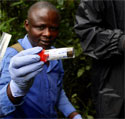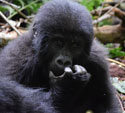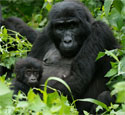 |
 |
 |
Project - Conservation Through Public Health |
 |
|
Conservation Through Public Health (CTPH)
ctph.org
 Dr. Gladys Kalema-Zikusoka led a team that investigated the first scabies skin disease outbreak that was eventually traced to local communities living around Bwindi Imprenetrable Forest who have limited access to basic health and other social services. CTPH recognised that, in order for conservation interventions to be effective and sustainable, it must include, support
and empower community members living in close proximity to the wildlife and habitats it seeks to preserve. Conservation Through Public Health, therefore, promotes biodiversity conservation by enabling people, wildlife and livestock to coexist sustainably through improving their quality of life in and around protected areas.
Dr. Gladys Kalema-Zikusoka led a team that investigated the first scabies skin disease outbreak that was eventually traced to local communities living around Bwindi Imprenetrable Forest who have limited access to basic health and other social services. CTPH recognised that, in order for conservation interventions to be effective and sustainable, it must include, support
and empower community members living in close proximity to the wildlife and habitats it seeks to preserve. Conservation Through Public Health, therefore, promotes biodiversity conservation by enabling people, wildlife and livestock to coexist sustainably through improving their quality of life in and around protected areas.
 Gorilla Health Monitoring trains national park rangers, trackers and members of the human and gorilla conflict resolution team (HUGO) to monitor the gorillas' health and collect fecal samples from gorilla night nests, both inside and outside the park when they
forage on community land. The samples are taken to the CTPH-run Gorilla Health and Community Conservation centre field laboratory where samples are regularly analysed from gorillas and compared to samples from people and livestock. Results are used to reduce
cross species disease transmission through timely treatments in gorillas, people and livestock while strengthening disease prevention and control.
Gorilla Health Monitoring trains national park rangers, trackers and members of the human and gorilla conflict resolution team (HUGO) to monitor the gorillas' health and collect fecal samples from gorilla night nests, both inside and outside the park when they
forage on community land. The samples are taken to the CTPH-run Gorilla Health and Community Conservation centre field laboratory where samples are regularly analysed from gorillas and compared to samples from people and livestock. Results are used to reduce
cross species disease transmission through timely treatments in gorillas, people and livestock while strengthening disease prevention and control.
 With this grant CTPH will conduct a disease sero-surveillance study by collecting blood, ticks and probang samples from 50 buffaloes, and the same from 100 cattle that graze in and around the two national parks. Gorilla fecal samples will also be collected and analysed for Tuberculosis.
With this grant CTPH will conduct a disease sero-surveillance study by collecting blood, ticks and probang samples from 50 buffaloes, and the same from 100 cattle that graze in and around the two national parks. Gorilla fecal samples will also be collected and analysed for Tuberculosis.
Work will be done to see the present status of diseases in these protected areas (including Queen Elizabeth National Park) to enable better prevention and control of cross species disease transmission affecting wildlife conservation and public health. Results of the study will be used to inform decision making to improve health management of wildlife, livestock and people.
|
|
|